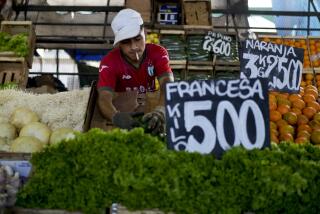Argentina Market Up Amid New Banking Rules
- Share via
BUENOS AIRES — Argentina’s stock market posted its biggest gain in six weeks and bond yields fell from record highs Monday after new restrictions on cash withdrawals eased concern the country’s banking system would collapse.
But public anger at the government’s move was intense, and many analysts warned it isn’t certain Argentina can avert deeper disaster.
The Merval stock index soared 6.1% to 214.75, led by banks Grupo Financiero Galicia and BBVA Banco Frances. Stocks also gained in neighboring Brazil, where the Bovespa index jumped 3.1%.
The Argentine government over the weekend restricted bank withdrawals to $250 a week, per customer, in pesos or U.S. dollars and banned most overseas transfers to avert bank failures and a devaluation of the peso.
’ But analysts said the measures may paralyze the economy, cutting sales at companies that operate on a cash basis and pushing up unemployment by making it difficult for waiters, housekeepers and other workers paid in cash to receive wages.
President Fernando de la Rua’s decree, signed over the weekend, allows the use of debit and credit cards and checks for payments. Argentines are accustomed to paying with cash, and many vented frustration at the government’s decision.
Meanwhile, Moody’s Investors Service reiterated Argentina’s Caa3 sovereign debt rating, the lowest of any country, and said the new controls may worsen the economy, which already is in recession.
Another rating agency, Fitch Inc., said the country was in default and dropped its rating to DDD from C in the wake of the government’s pressure on domestic banks and investment funds to swap $41 billion of federal debt for new loans that pay less interest and delay repayment.
The government Friday swapped $50 billion of debt including provincial loans. A similar exchange with international bondholders is planned.
The government, short of cash to pay its debts because the three-year-long recession has cut tax revenue, is defaulting on at least $95 billion of federal bonds and most of the provinces’ $23 billion of debt.
Traders said one explanation for the markets’ rally Monday was that some fearful domestic investors bought bonds and stocks, transferred them abroad, then sold the securities to skirt the new restrictions on cash transfers out of the country.
Argentines have pulled $12.4 billion, or 15% of total bank deposits, since the end of June, and Argentine media said another $700 million was withdrawn Friday.
The government, which has blamed foreign investors for prompting the bank run by speculating against the nation’s bonds and currency, also banned banks from lending in pesos.
In addition, banks are prohibited from charging a commission to swap pesos into dollars for all electronic transactions.
By eliminating peso loans and creating incentives to switch peso deposits to dollars, the government took a step toward adopting the U.S. dollar as the country’s official currency. But such a conversion will be difficult if not impossible to complete, analysts said.
More to Read
Inside the business of entertainment
The Wide Shot brings you news, analysis and insights on everything from streaming wars to production — and what it all means for the future.
You may occasionally receive promotional content from the Los Angeles Times.










